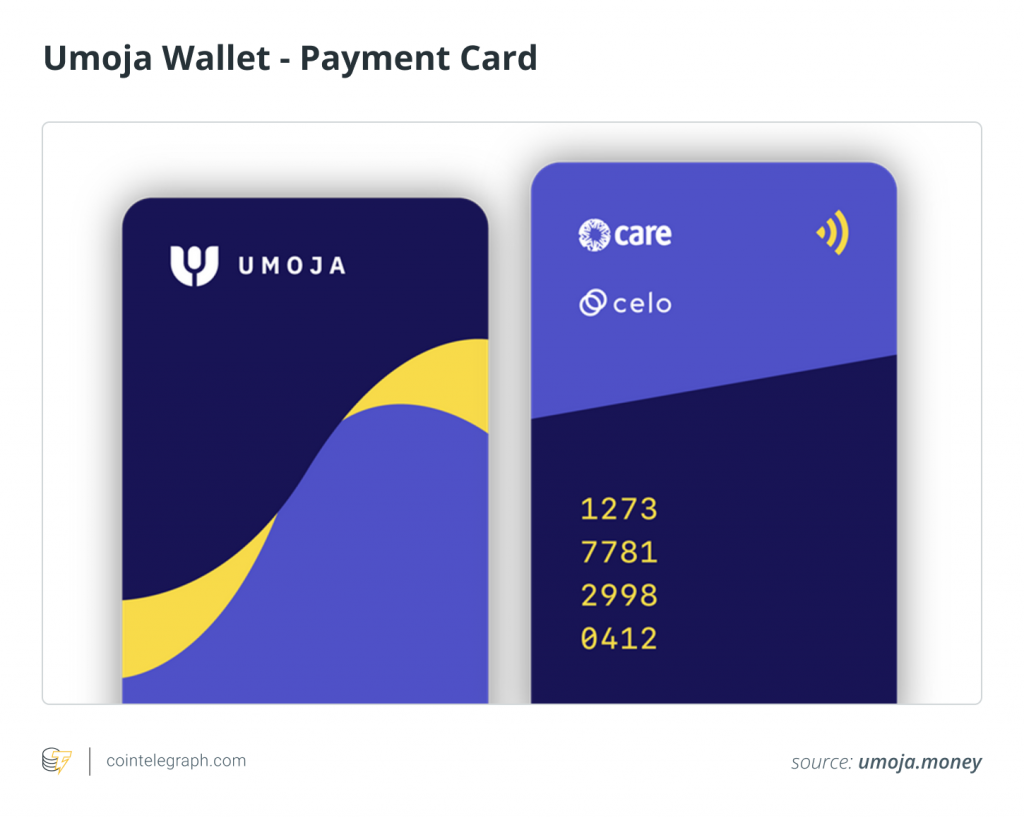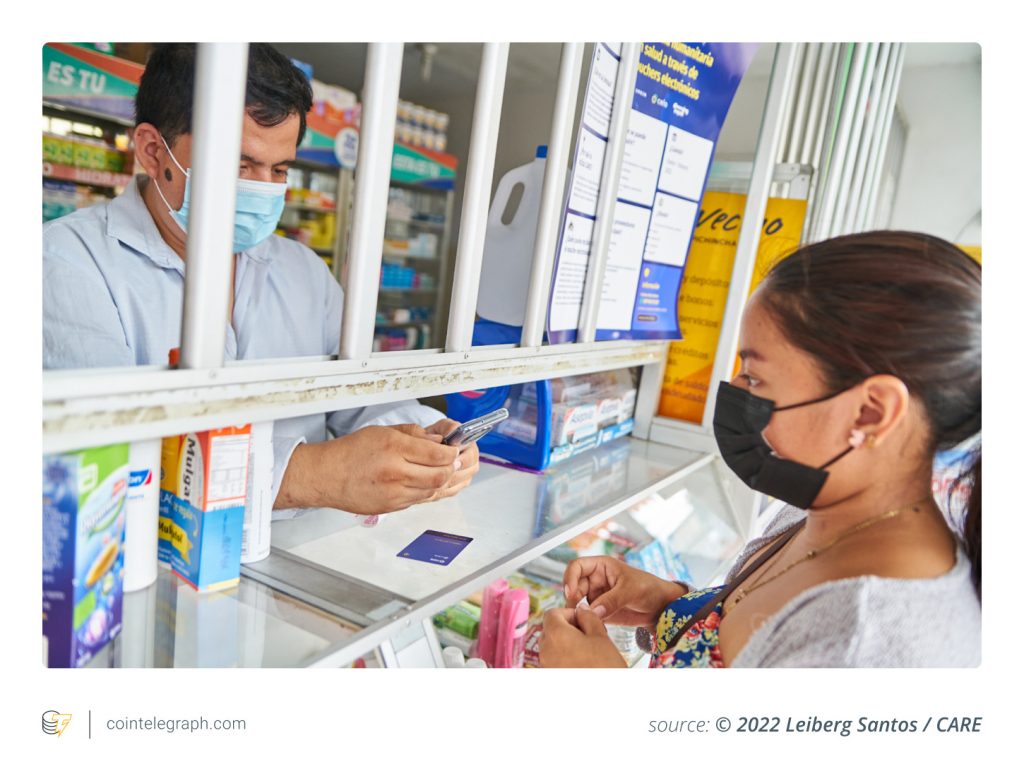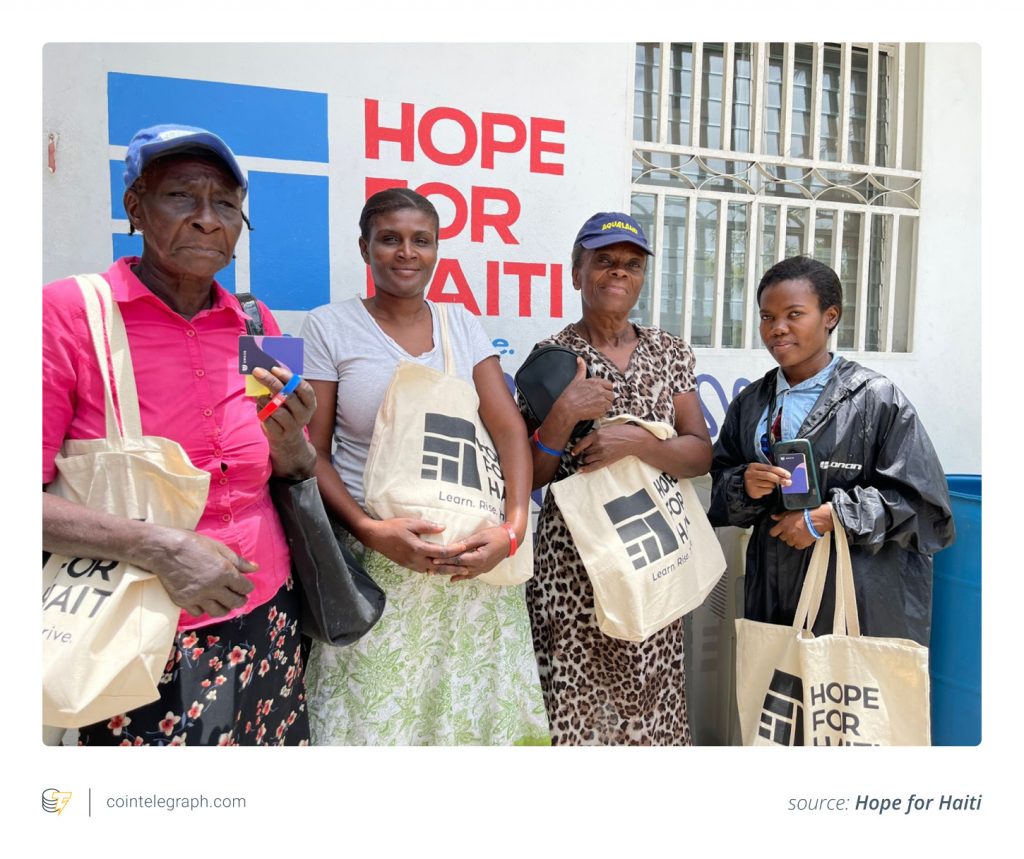The primary use case for cryptocurrency in most wealthy countries is acquiring it and holding it, trading it, or using it in various other ways to make more money. In the developing world, where access to financial and banking systems is limited or nonexistent, innovative humanitarian organizations are piloting micro-blockchain ecosystems.
In the summer of 2021, Hope for Haiti was ready to launch a cryptocurrency pilot program to provide 150 mothers with cellphones, digital wallets and payment cards that use near-field communication technology. Each mom participating in its community nutrition program was set to receive $50 per month in cUSD for six months to spend on family essentials. A select group of local vendors was trained to use the system and poised to accept the cryptocurrency payments. On Aug. 14, a magnitude 7.2 earthquake rocked Haiti’s Tiburon Peninsula, decimating the area.
Hope for Haiti had to delay the project and immediately shifted to disaster relief. The organization received thousands in cryptocurrency donations in short order. Skyler Badenoch, Hope for Haiti’s CEO, tells Magazine: “We probably brought in a hundred grand in crypto to support our earthquake relief efforts. Whether it was $50,000 in Bitcoin from Binance Charity. [..] We were getting Ethereum donated to us. We got $10,000 in Dogecoin donated to us. It came from all over.”
EMERGENCY APPEAL: Thousands lost lives, property & access to basic needs after the devastating #HaitiEarthquake. We call on our community of #crypto donors to come together & support crucial relief work being done by @HopeforHaitiFL & others on the ground https://t.co/dUZX4n7dJu pic.twitter.com/zVDk8qPXUu
— Binance Charity (@BinanceBCF) August 24, 2021
Just a year earlier, Sandra Uwantege Hart, who at the time was Oxfam International’s blockchain innovations and cash transfer lead, was preparing to launch a cryptocurrency pilot in the south Pacific Ocean country of Vanuatu. After a successful first effort in the region, Uwantege Hart was hoping to scale Oxfam’s UnBlocked Cash solution fivefold for this ambitious phase-two project.
Then, just days before launch, Cyclone Harold slammed into the island nation. The category 5 storm decimated parts of the archipelago, an island chain economically dependent on tourism that was already reeling from COVID-19 lockdowns and an active volcanic eruption.
Cyclone Harold hits Vanuatu, after killing 27 in Solomon Islands
It is a category five storm, the most severe, with 215km/h winds https://t.co/LeWqxUQowa
— BBC News (World) (@BBCWorld) April 6, 2020
Almost overnight, Oxfam and its local partners brought to scale a blockchain lifeline, originally tested with 200 participants and 27 local vendors, to nearly 5,000 households and 357 vendors. They worked with the local chamber of commerce to issue cell phones to merchants and train them on the UnBlocked Cash system. On the ground, a network of about 15 charitable organizations enrolled affected citizens and managed the system. In a conversation with Magazine, Uwantege Hart says that “It’s almost like the whole idea of a decentralized, distributed model is exactly what worked in terms of how we operated and deployed the system.” She adds:
Let’s decentralize, let’s provide a really good automated tool to deliver assistance and decentralize the way that tool is deployed across multiple organizations in multiple locations concurrently, to make sure that we can scale as quickly as possible.
Uwantege Hart went on to co-found the global technology firm Emerging Impact. Partnering with the Celo Foundation, Kotani Pay and Polish Humanitarian Action, Emerging Impact soon facilitated efforts to integrate DeFi tools into a cash reward program in Kenya. Celo, the donor, built a dashboard to deposit funds directly into Kotani Pay wallets. In the field, Kotani Pay recruited Maasai women to participate in the pilot while Polish Humanitarian Action monitored transparency. According to Uwantege Hart, “I can’t even tell you how much time that saves.”
She clarifies further that to make it happen, multiple players from all over came together: “This is between Celo, based in California; Polish Humanitarian Action, based in Poland, with some offices in Somalia; and the implementing partner in rural Kenya, and Maasai women who are building rural infrastructure, building dams to conserve water, so that they can start to increase their agricultural output.”
Umoja
The experiences gained and lessons learned in these pilots led to the development of Emerging Impact’s Umoja solution, an all-in-one humanitarian assistance suite. One of the first projects to utilize the system was CARE’s digital cash and voucher assistance pilot in Ecuador, initiated in September 2021. CARE Ecuador’s monitoring coordinator, Ronald Pisco, tells Magazine the pilot provides electronic vouchers and NFC payment cards to 250 women who don’t have access to public services.
The participants, primarily migrants and refugees from Venezuela, can use the cards to purchase health services, medicine and hygiene products from 10 participating vendors. The cards are loaded with $50 to $100 in cUSD, with the vendors cashing out and converting the stablecoins into local currency on a weekly or monthly basis.
CARE USA’s senior director for market-based approaches, Christian Pennotti, tells Magazine that “The end recipients, […] they’re getting handed a card that they can pay for goods and services. [..] They don’t have to download a special wallet. They don’t need a 17-digit-long key.”
Although there can be a high technical barrier to entry into the crypto space, such as access to the internet and cell phones and the need for technological literacy — things currently inaccessible to the program’s participants — Pennotti believes this exchange is pretty straightforward for the women who are participating: “On the back end, there’s a whole bunch of really incredible things happening. But in her experience, CARE is able to hand her a card, and she gets what she needs.”
CARE wanted to test a blockchain-based, easy-to-use, cashless solution to replace an inefficient paper-based voucher system. According to Pisco, it can take weeks to pay back vendors. CARE staff would have to keep track of all the paper vouchers, collect them and send them back to the office. The process is expensive and time-consuming. Uwantege Hart shares that preliminary metrics from the pilot suggest delivery times have been shaved down by more than 50%. Costs have gone down, and ease of monitoring has gone up.
Umoja’s other debut deployment is back on track, as the temporarily delayed Hope for Haiti pilot is currently in progress — and recently doubled in size and scope thanks to Coinbase. According to Badenoch, when Coinbase heard about the pilot just after the earthquake, it contributed $150,000. It saw the project as something that would continue to help victims of the earthquake, long after everyone else had gone home.
Badenoch believes that “This is the next iteration of our work in our collaboration with important players in the cryptocurrency and blockchain ecosystem.” He adds further:
We think that it’s going to help us tell the story about the value and the power of cryptocurrency and blockchain technology and the ability of crypto and blockchain to help alleviate poverty.
According to Badenoch, Coinbase’s role in the project is the “difference between piloting something that is temporary help and piloting something that actually shifts the way a household economy functions.” Hope for Haiti integrated Digicel’s mobile cash solution into the cash-out process for participating vendors, which means there is a local off-ramp within Haiti’s financial ecosystem. “That is huge. That is the difference between financial inclusion and giving money,” according to Uwantege Hart.
Financial inclusivity
Uwantege Hart believes that humanitarian aid is ultimately “short-term assistance.” She says that one of the challenges for all humanitarian agencies is how to responsibly transition people from receiving “a bunch of stuff or payments for free” into a scenario more focused on recovery, where they are able to connect the assistance received to regular access to goods or services in their everyday lives.
Progression out of poverty, or the risk-prone situation that has exposed them to poverty, is the primary objective. Emerging Impact hopes to eventually segregate wallets, still attaching them to payment cards but also to payment apps and individual savings accounts.
Following that same train of thought, CARE’s other crypto pilot worked with village savings and loans associations in western Kenya adversely affected by the COVID-19 pandemic. In Siaya County, a rural area dependent upon agriculture, CARE asked savings group members what they needed to make them whole. According to Pennotti, they all said they needed more funds to sustain current group businesses or startup funds to facilitate income streams generated from new group businesses.
Although nearly 85% of the people CARE works with in Kenya are unbanked and don’t have full access to the financial system, many have mobile wallets. Binance’s Blockchain Charity Foundation funded this project by directly depositing BUSD, a stablecoin pegged to the U.S. dollar, into participant’s Trust Wallets. The groups then use those funds to purchase goods and services from local vendors.

Helen Hai, executive vice president at Binance and head of Binance Charity, tells Magazine, “Our pilot project working with CARE and village savings and loans associations was new territory for Binance Charity, but one we found hugely exciting because if successful, it would provide a solution for delivering cash assistance and reaching many financially vulnerable people with a much lower cost compared with traditional methods.”
She explains how the process works: “All transactions are recorded on the public ledger, which is trackable, immutable and offers 100% transparency to the public.” Hai adds:
Our aim was to promote the economic recovery of VSLA members from the impact of COVID-19 and associated vulnerabilities, through the provision of stablecoins offered via blockchain technology. Crypto education was a key part of the success of this project, which meant we were also able to provide a new skill as well as financial assistance.
According to Pennotti, one of the objectives in Kenya was to understand if the tech would work in these communities. Would it be accepted, and what might the benefits be for CARE and for donors?
The other objective was to build institutional awareness around the potential for financial inclusivity. Pennotti was looking for a DeFi project that would help on-ramp these groups to crypto, potentially then taking advantage of staking and other sorts of wealth-generators like yield farming in a way that is accessible. “You don’t have to understand how it all works, just what the financial benefits are,” Pennotti said.

Mitch Eiven
Roaring Kitty fraud suit dropped, Ethereum Foundation hacked, and more: Hodler’s Digest, June 30 – July 6
Roaring Kitty fraud lawsuit voluntarily dropped, Ethereum Foundation email server hacked, and Circle becomes first MiCA-compliant stablecoin issuer.
Read moreWhy join a blockchain gaming guild? Fun, profit and create better games
Blockchain game developers are turning to gaming guilds for market research and to enable players to help create better games.
Read moreChina mocks US crypto policies, Telegram’s new dark markets: Asia Express





